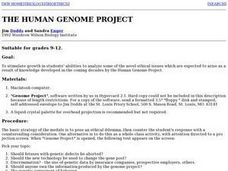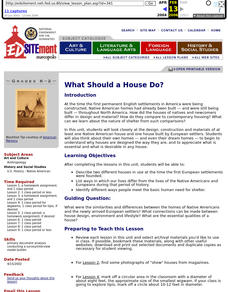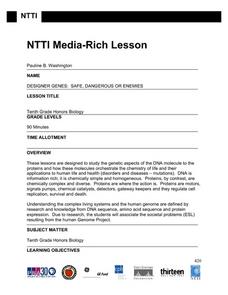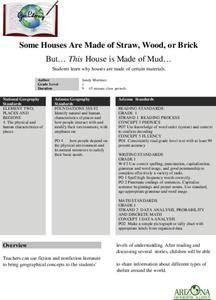Curated OER
Anatomy of the Brain
Students explore human anatomy by completing a quiz. In this brain lesson, students read assigned text which discusses the different elements of the human brain and how they are used in everyday experiences. Students answer a multiple...
University of Arizona
The Leg Bone Is Connected to The...
Students discover the names of 13 major bones in the human skeletal system. They construct their skeleton using paper plates and other simple products. Links to templates are provided within the resource.
Curated OER
Favorite Foods
Students explore human health by completing food choice worksheets. In this world hunger lesson, students discuss the importance of eating three daily meals and how to feed the underprivileged through charities and soup kitchens....
Curated OER
Where Do I Fit In?: Mental Mapping Student Neighborhoods
Students examine geography through the themes of place, human/environment interaction, and region. They create a mental map of their own neighborhood, analyze their role in the world, and design a neighborhood that reflects their needs.
Curated OER
A Home for a Cricket
First graders build a habitat for crickets after studying animal survival needs. They care for and observe the crickets in the classroom habitat.
Curated OER
HIV/AIDS: Basic Facts
Students complete worksheets and play the "Onion Ball Question and Answer Game" as an introduction to the basic facts about AIDS and HIV, such as what the virus is, the body fluids that transmit the virus, and the the most common methods...
Curated OER
The Human Geonome Project
Young scholars explore the Human Genome Project (HGP). Students research a fact situation, examine genetic data given, and discuss choices available for a solution. Young scholars consider the ethical question and consequences of each...
Curated OER
How Does Human Respiration Relate to Radon?
Middle schoolers examine the role of human respiration and how it relates to radon. They identify damage to the lung from the exchange of carbon dioxide and oxygen. They work together to complete a lab activity and worksheet.
Curated OER
Pond Habitats
Students define what a pond habitat is and explain what animals live in this habitat. They discuss what can harm or destroy a pond habitat. They create a poster of what could harm a pond habitat including illustrations and sentences. ...
Curated OER
Investigating Our Past: Where Did Humans Come From?
Students brainstorm about evolution and explore the processes of evolution. In this investigative lesson students map out evolution and compare the two theories after researching them.
Curated OER
Animal Life Cycles
Students participate in numerous activities to gather information about parts of the life cycle. In this life science instructional activity, the teacher choose from a number of activities to create or support an interdisciplinary unit...
Curated OER
What Should a House Do?
Students describe two different houses in use at the time the first European settlements were founded. Students list ways in which our lives differ from the lives of the Native Americans and Europeans during that period of history.
Curated OER
ESOL Vocabulary for Body Parts
Students review and write the vocabulary for basic body parts. They identify parts of the body along with new verbs then complete an activity sheet of labeling body parts and complete sentences using the correct vocabulary word.
Curated OER
Food for Thought
Fifth graders explore the brain and what is needs. In this biology lesson plan, 5th graders will work on a series of activities that will allow them to learn about the brain, its parts, and the best foods to eat for their brain.
Curated OER
Food Labels in the Classroom
Students study the nutritional information on food labels and become familiar with the basic dietary needs of the human body. They write letters to food companies.
Curated OER
Economic Reasoning: Why Are We A Nation Of Couch Potatoes?
Students examine the visual aids of this lesson to study the costs and benefits of decisions about diet and exercise. They investigate human choice as it affects behavior and in turns effects economics and consequences.
Curated OER
HABITAT for the other 90%
Learners examine the connection between the habitat needs of endemic species to the habitat needs of humans. In this habitat lesson learners research the habitat requirements of a given family then develop an idea to improve the habitat...
Curated OER
Move it! With Simple Machines
Students know the six simple machines and explain what they do and how they have changed the lives of humans.
Curated OER
DNA Technologies
After giving some of the basic characteristics of the DNA molecule, the slides provide process information and many detailed diagrams about plasmids, vectors, and their application in cloning genes.
Curated OER
Temperature and the Tomato
You will need a photovoltaic system and monitor at your school in order to obtain all of the data required to thoroughly implement this instructional activity. Your class monitors daily temperature and insolation amounts over a two week...
Curated OER
Literary Analysis of Theme
Remember reading "The Lottery" and "The Possibility of Evil" by Shirley Jackson? Learners can experience and analyze the tension, themes, and human experience found in these pieces through reading and class discussion. They use...
Curated OER
How We're Connected
Students take a survey in order to find out how they live in relationship to the environment. They take the time to investigate the differences between a need and a want. This is done as part of the self-assessment. Students also study...
Curated OER
Some Houses Are Made of Straw, Wood, or Brick: But... This House is Made of Mud...
First graders read and discuss several stories. They share information about different types of shelter around the world. They explain that lifestyles and shelter depend very much on where people live and how they use the resources...
Curated OER
Pizza and the Economy
Students become aware of the history behind pizza and how it was adapted to the economic and geographic conditions of the United States. They have a basic understanding of the concepts of supply and demand.

























